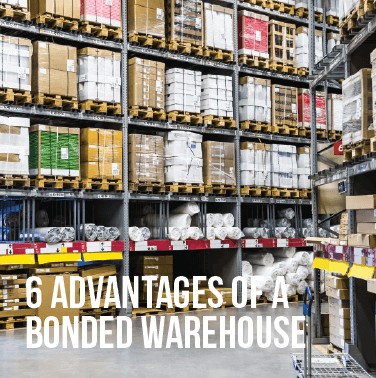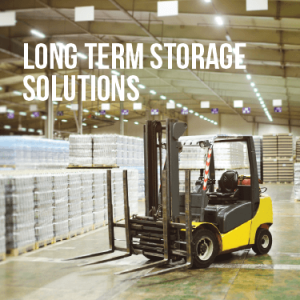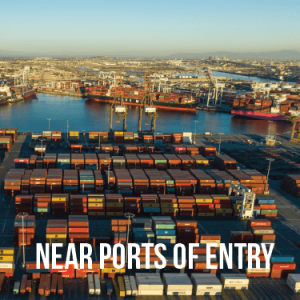
 Copy URL to Clipboard
Copy URL to Clipboard
Going into the import and export business involves coordinating multiple moving parts. Arranging shipping and warehousing while keeping up with documentation to pay duties can slow you down. There are advantages of a bonded warehouse that can help you solve some of those challenges.
U.S. Customs and Border Protection (CBP) regulates the establishment of customs bonded warehouses. Benefits to using a bonded warehouse may include:
Keep reading to learn more about bonded warehouse advantages and how working with a 3PL provider can be beneficial.
Learn about six ways that bonded warehousing can give your business an advantage and provide you with peace of mind.
Table of Contents
A customs bonded warehouse, or simply a bonded warehouse, is one where imported goods can be kept until duty tax is paid. Bonded warehouses are regulated by the CBP. Importers can store merchandise in a bonded warehouse for up to five years without paying the import tax.
This and other benefits may provide importers with financial and logistical advantages. The CBP authorizes 11 different classes of bonded warehouses to cover multiple types of merchandise. Warehouses can be public or private and some can even be used for manufacturing purposes.
Consider six specific ways that bonded warehouse advantages can help you and your business.

A common problem in international trade is figuring out where merchandise can be kept. Goods need to be stored for domestic market distribution or for manufacturing to export back out. Dutiable imported goods can be stored in a bonded warehouse for up to five years without having to pay import tax.
This benefit may be beneficial for businesses trying to manage the challenges of international trade during an ongoing global pandemic. Being in bond also locks in the amount of duty tax.
Demand for certain goods has dropped sharply leaving some with an overwhelming amount of inventory.
Store merchandise safely in a bonded warehouse until the market for them picks up again. A business may still make a profit from their imports this way. Otherwise, they may be forced to sell far below value in an attempt to reduce upfront costs.
These long-term solutions are available for a variety of different goods. There are facilities with refrigeration, dry storage, temperature control, and more.
For help with inventory management, check out our article, “How to Manage Warehouse Inventory.”
The cost of international shipping keeps going up. At the same time, the cost of getting freight from ports to distribution centers and retailers is also rising. Businesses need to find a way to maximize their profits while keeping products affordable enough to be sold.
Bonded warehousing can help shippers meet that goal in two different ways:
Each of these can help your business in a different way.
When merchandise enters a bonded warehouse, the owner of the warehouse assumes a liability, or bond, for that merchandise. Customs duties will not need to be paid until merchandise is withdrawn for domestic consumption in the United States.
Keeping goods that aren’t selling can drag your business down. You’re paying duty and storage up front without turning a profit quickly or at all. Transferring imported inventory to a bonded warehouse can save a company enough money in the short term to survive long-term.
Wait for supply chains and demand to return to their normal behaviors. Your business may then be able to sell your inventory at a profitable price.
A business that imports to export after manufacture or alteration can also benefit greatly cost-wise. In a non-bonded warehouse, import duties must be paid upon arrival in the majority of cases. Depending on the goods, there may also be an export tax once the items are ready to sell overseas. Payment of import duties is not required for merchandise being sold for export.
Certain classes of customs bonded warehousing allow your business to alter and manufacture imported items without paying the import tax. So long as the items don’t enter the domestic market, the payment is deferred. Double tax is then avoided when possible, providing some companies with 25-30% in tax savings overall.
Perhaps you were using the facilities for storage of items to be sold domestically but have been unable to do so. If demand picks up elsewhere, your business can take advantage and sell for export without paying the import duties.

Some product demands are more predictable than others such as seasonal items. Merchandise connected with major holidays or national events can also be predictable.
Because long-term storage is possible at a bonded warehouse, merchandise can be ordered and stored ahead of demand. Having in-demand merchandise already in place may improve customer relations.
Trying to get ahead of next fall’s pumpkin spice craze? Want to have popular jerseys on hand for the FIFA World Cup? Using bonded warehousing services allows you to stock up ahead of time. When the demand goes up, items are sold and distributed in a timely manner, earning your business happy and loyal customers.
See our article on demand planning to see how you can maximize this benefit.
Getting your merchandise into the U.S. is only one step of the import industry. Once it gets here, you need to be sure it will remain at a secure location while awaiting distribution. While any decent warehouse can offer security, bonded warehouse facilities are still a step above. Merchandise stored in a bonded warehouse is under the joint custody and supervision of the CBP and the warehouse owner.
Because of government oversight on the facilities, extra precautions are in place to ensure security of goods and related documentation. Regular audits ensure that these measures remain in place.
Safety and security requirements that must be met by bonded warehouses include:
Depending on the class of warehouse, other customs supervision may be required of the warehouse owner. The oversight means bonded warehouses are extremely secure, providing you with peace of mind when importing and storing high-value items.
While excellent for secure storage in general, bonded warehouses are also a unique solution for storing restricted imports. Direct CBP oversight of many bonded warehouse facilities allows storage of restricted goods for longer periods of time than standard warehouses.
Besides the money and security benefits of storing restricted merchandise, the time frame for storage in a bonded warehouse also helps. Restricted goods come with a large and varied amount of paperwork. Haste makes waste. Errors on the documents are likely to get your goods destroyed upon entry and land you with the cost for it.
Reviewing documents for errors may be easier when the pressure to get it done quickly isn’t so bad.
However, as with any restricted import, be sure to carefully research before beginning the process. Speak directly with the CBP or get in touch with a customs broker who can guide you through.

Bonded warehouses are usually kept near ports of entry since they deal with imported goods. The CBP has over 300 ports of entry between the continental U.S., Puerto Rico, and the U.S. Virgin Islands.
When shipping to any of these ports, the CBP will likely have a bonded warehouse nearby that can meet your needs. Many of the main import venues in the U.S., such as the Port of Los Angeles, are overwhelmed with shipments. The same can be said of nearby warehouses.
Since bonded warehouses can be found even at less popular ports, you may find a long-term storage solution more easily. A warehouse in close proximity to a port of entry may also save you money on freight forwarding and transloading services.
Bonded warehouses, public and private, rely on logistics services for transport. Many bonded warehouses contract with various carriers and freight forwarders. Bonded warehouse partnerships with logistics services are usually reliable because of the strict regulations.
Owners of bonded warehouses wouldn’t want to do business with questionable carriers. The CBP may be quick to revoke their operating permission in case of a violation.
Bonded warehouses are used frequently with in-bond transactions. An in-bond transaction allows cargo to be moved from port and through the U.S. without paying customs duties. Bonded carriers would be used in these transactions and are regulated in much the same way warehouses are.
Bonded carriers can be:
Safety and security continue to be priorities outside of the physical location too. Carriers, cartmen, or container stations that handle “in-bond” merchandise must have an Activity Code 2 (C2) Bond from the CBP. The bond keeps them compliant with all the same regulations as a warehouse.
Moving and storing freight can be expensive. Current events have made those costs even higher and might be making it harder for you to do business.
These six bonded warehouse advantages may help your import business keep growing despite the challenges. Connect today with R+L Global Logistics to help you answer any questions you have about your fulfillment and distribution needs.
R+L Global Logistics can be your partner for 3PL warehousing, fulfillment services, kitting services, and more. Request a quote now and see how our services can help you.

I am looking into the viability of sell New Zealand made Health Supplements into China, and wanted some honest feedback regarding the costs, timing, regulatory, transportation and tax implications of doing so.
Can someone come back to me on this, please?